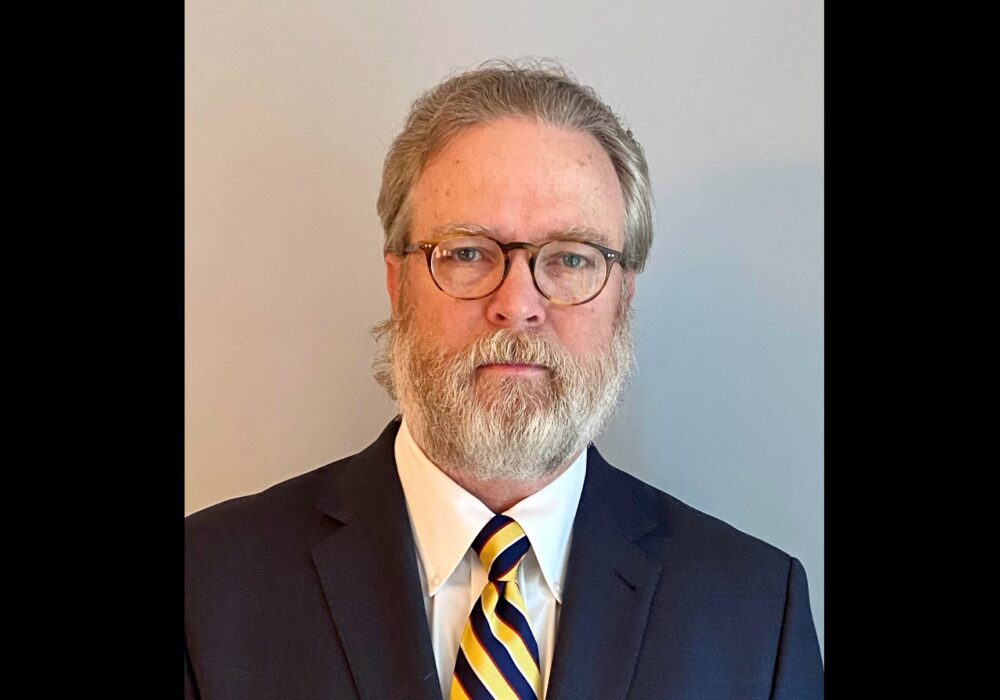Alumni Career Services Coach Marty Speight interviews Kerry Kirk (MBA ’95) on ‘working in retirement/retirement transitions.’ Upon graduation from the Darden School, Kerry enjoyed a 28-year single-firm career at Cambridge Associates, LLC, a global investment firm specializing in college and university endowments and philanthropic foundations. Prior to attending Darden, Kerry served eight years as an officer in the U.S. Marine Corps. He retired from Cambridge Associates in April 2023.
So, Kerry, what does “working in retirement” mean to you?
Well, first I think the word retirement itself should be retired. A more apt word today is rewirement. I was looking to re-wire my life in terms of how I spend the majority of my waking hours, not looking to withdraw from the playing field. And rewirement better captures the reality many of us face today. Some of us seek fresh activities and new avenues. Some want to continue even the same work activity as before. But, most of us want to experience it all at a much slower pace – and with less psychological and physical energy invested.
I realized early on this meant that I’d be working for myself, something I’d never done. It meant becoming a freelancer in order to directly manage the mix and intensity of the avenues I’d pursue. So, working in retirement thus far has been defined as being my own boss in terms of assessing engagements – how many, what types, requiring how much time, etc.
When you first considered leaving your full-time career, what did you expect of the transition? And, how has it worked out in fact?
It’s materially different than I expected but in a positive way. I expected to become a part-time freelance writer. I was going to go on Fiverr and Upwork and bid for B2B, B2C content and copywriting gigs from my home. I even spent a couple years incubating that notion, taking on some pro bono assignments while I was still in the full-time workforce. I thought freelance writing would be 100% of what work I did. So far, it’s been about 15%, because serendipity or something like it happened.
First, I learned that a local, veteran-owned brewery was looking for part-time brand ambassadors. Low pay, but a 35% discount in the taproom! I said yes. Three months later I learned of a non-profit that advocates for bipartisan legislation trying to bring some common sense to our divisive politics. They were recruiting part-time regional ambassadors. I made the cut, and now I conduct briefings on Capitol Hill. The pay is what you’d expect, but it’s income and the work keeps me up and going and focused on utterly fresh content! Finally, I did land a gig writing a recurring column for a destination-travel magazine.
What has surprised, annoyed, or delighted you about this shift?
What annoyed but didn’t surprise me is that self-employment, even at this level, is complicated. Figuring out your business type, registrations, doing your own marketing and gig acquisition, banking, bookkeeping, insurance, business taxes, and quarterly estimated Federal and State income taxes were not topics I had to worry much about before. Not having ready-at-hand basic IT support has been a significant challenge. But these are annoyances and hurdles weighed against possibly greater annoyances of maintaining the executive life.
There is nothing corporate about my work life now. No staff meetings. No dealing with the hot-button corporate issues and programs that so many struggle with or argue about. I have no commute to speak of. And I have not missed climbing on and off commercial flights or wasting hours in the air, airports, and hotels. At all. I think the currency of life in my demographic is time not money. That I don’t earn very much freelancing is not a surprise to me – but I am delighted that it doesn’t bother me.
What advice would you give other Darden alumni coming into this age/stage?
Define where you want to be on the responsibility-accountability scale. To clarify, some people transitioning want roughly the same level of responsibility, prestige, and accountability they had in the full-on workforce, just less time devoted to it. Others decidedly want to dramatically lower or eschew those job characteristics. It’s not that I wish to be irresponsible or unaccountable. But the consequences factor can play in. Running a significant book of business is a different matter than working a few hours a week at a local brewery or a retail outlet. So, I advise that alumni looking to shift gears assess what I call their “responsibility-accountability” factor. It can lead you to different landing spots depending on how you define that.
Related, I think what we do at this stage is more important than what we’re paid or what people think of our new work life. I have had immense levels of responsibility in my work life from service in the Marines across four continents to influencing major decisions in swanky board rooms. But I feel just fine today running a 3-hour beer tasting and gabbing with patrons about the product. Or writing articles for a small distribution magazine. Pick work activities that feed a long-held “like to try.” It’s good to be engaged in what you like versus what you or someone else thinks you should be doing.





